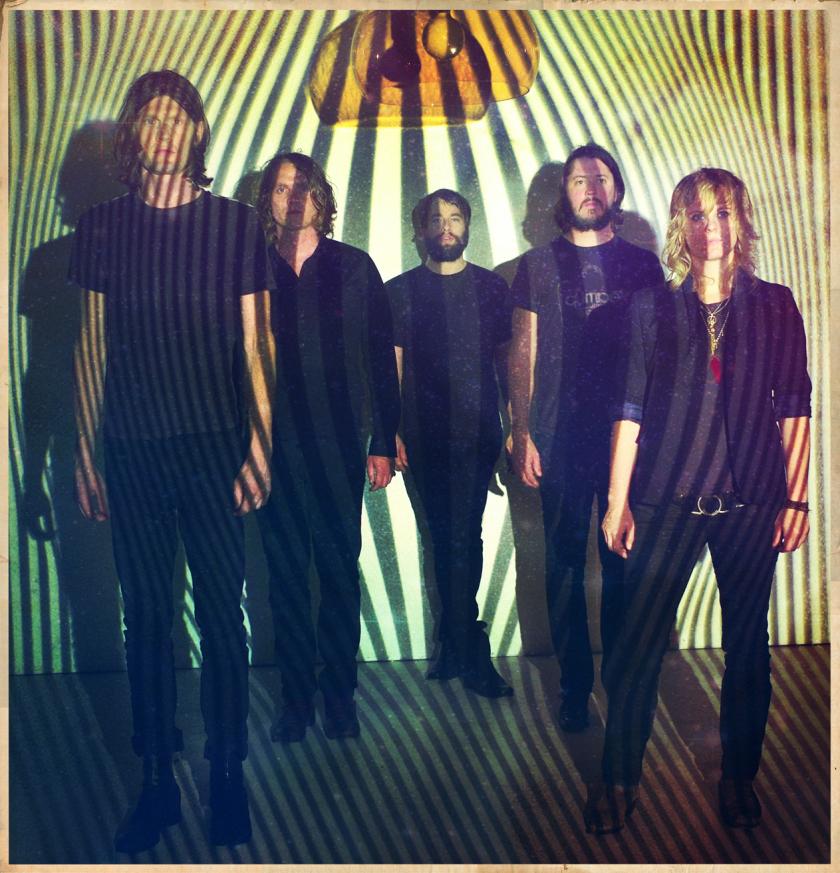A reverb-swathed guitar picks out a rudimentary surf riff. Drums whack out the Bo Diddley shuffle. The four-to-the-floor bass throbs. Vocals drag the vowels out. As whole, the sound spirals, pulses. At eye-rattling volume, The Black Angels serve up a psychedelia that’s mind expanding, but more about the darkness within than the light without. Their trip isn’t the worst ride you’ve ever been on, but it sure doesn’t take you to the third bardo.
We all know the Sixties dream was confirmed AWOL with Altamont, 1969 and Chuck Manson. Although Austin Texas’s Black Angels’s vibe is smack bang with all that bad stuff, their inspirations are from a couple of years earlier, from before the acid went bad and before rock wimped out or went back to its roots. Even so, they found darkness amongst 1967’s day-glo.
They take their name from The Velvet Underground’s “Black Angel’s Death Song”. They spent part of 2008 backing fellow Austinite and former 13th Floor Elevators leader Roky Erickson, who ended the psychedelic era in a mental hospital. The band’s old logo featured former Velveteen Nico, another Sixties icon hardly at one with peace, love and flowers. Late year’s Phosphene Dream album opened with a song called “Bad Vibrations".
Where The 13th Floor Elevators sang of the kingdom heaven being within you, The Black Angels first album, 2006’s Passover, featured a sideways Pink Floyd reference on a track called "The Sniper at the Gates of Heaven". Religious imagery and references crop up repeatedly in The Black Angels's songs. As do evocations of the wars in Viet-Nam and Iraq.
Their musical coherence was echoed by their stance on stage
Last night opened with “Mission District", from second album Directions to See a Ghost. "Young Men Dead" from Passover was up next, followed by Phosphene Dream’s “Bad Vibrations". Heard individually, these songs from their three albums stand apart. But live, played one after the other, it didn’t matter what album they came from. On stage, The Black Angels stuck to their earlier sound, a sound which couldn’t have evolved without Spacemen 3’s “Take me to The Other Side”. The cleaner production of Phosphene Dream was ditched and "Yellow Elevator #2", "Haunting at 1300 McKinley", "The Sniper", "Sunday Afternoon" and the album’s title track (and set closer) were all the better for it.
Their musical coherence was echoed by their stance on stage. Beyond singer Alex Maas speaking to the audience a few times, they played to themselves. Maas occasionally shuffled, and livened up when he strapped on a bass guitar. Otherwise, he spent most of the evening sideways on to the audience. Bassist Nate Ryan and drummer Stephanie Bailey were all-but invisible. They were unified, but it wasn’t a vehicle for showbiz moves.
Some lightness was offered though. The encore kicked off with the peppy and twin-organed “Melanie’s Melody”. It also featured Phosphene Dream’s goofy “Telephone”. They didn’t become The White Angels, but it was cheering to know they can’t be bummer Bob all the time.
It was pretty certain this wasn’t going to be a cheer-you-up, grin-inducing evening. But no matter how you turn things on their head, if you’re going to be explicit about what you draw from or invert, you’d better make sure it doesn’t cast a shadow it’s impossible to escape from. That was no problem for The Black Angels. They became the shadow.
Watch the video for The Black Angels's "Telephone"















Add comment